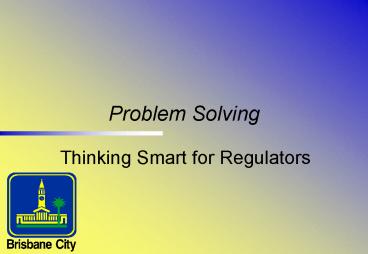Problem Solving - PowerPoint PPT Presentation
1 / 18
Title:
Problem Solving
Description:
Cats, birds livestock. Dangerous dogs, guard dogs prohibited dogs. Dogs. Animals Local Law 2003 ' ... Gold Coast City Council v. Paradise Project per Thomas J ... – PowerPoint PPT presentation
Number of Views:29
Avg rating:3.0/5.0
Title: Problem Solving
1
Problem Solving
- Thinking Smart for Regulators
2
The Regulators Lot
- Defending Regulation
- Impact of Change
- Why problem solving?
3
Does any of this Sound Familiar?
- A focus on the efficiency of internal processes
rather than their effectiveness - Work is dominated and determined by responding
to complaints - Knowledge and experience of operational staff is
not drawn on - The task comes second to the tools
4
What is Problem Solving?
- Like due diligence its fundamentally a way of
thinking and behaving NOT a process - Focus on the problems
- Understand the problems
- Develop flexible responses to the problems
- Evaluate their effectiveness
- Keep dancing
5
Can Problem Solving Help? - Local Government as
an Example
- Local Governments have -
- An enormous range of regulatory responsibilities
- Responsibility for managing some of the hardest
risks - both high frequency low impact and low
frequency high impact - Limited powers and tools available to them
- Thinking smart is essential when you have to
manage a lot with a little.
6
Hard to manage risks - high frequency low
individual consequence
- To succeed, a large number of people need to
change their behaviour and stay changed - The standard techniques - permit/approval regimes
and responding to complaints - Both can be effective but both can end up being
the end in themselves - The standard solutions - customer service,
process reforms, privatise, deregulate - but if
the problem remains? - Problem solving focuses outward and can find
responses - maybe a traditional one or something
entirely different.
7
Limited Powers
- LGs arent at the top of the regulatory food
chain! - Temptations -
- we cant do anything about it because we havent
got the powers - The fine is too high, prosecution is too
expensive, its not worth our while - The fine is too low, prosecution is too long,its
not worth our while - On the spot fines are a panacea - quick,
reactive, easy to count. And they look good in an
annual report. - Problem solving often doesnt require any new
powers at all!
8
Why is Problem Solving so hard?
- Its an approach not a process and its lateral
and radical - It may disrupt standard processes and the way we
do things - Responses may be short term, may vary even within
one LG area and require budget flexibility - none
of that is easy for management. - Cannot be reduced to a system and applied as an
IT package to all regulatory enforcement
9
A Customer Focus - who is the regulators
customer?
- Who is being restricted?
- Who is being benefited?
- Who pays the fee?
- Who bears the cost of non-compliance?
- Who derives the profit from non-compliance?
10
Customer Service for the regulator
- Timeliness
- Technical competence
- Courtesy
- Respect
11
Problem Oriented Laws
- Problem Specific
- Should there be a Law at all?
- Crafted from a range of regulatory alternatives
- Good Drafting Standards
- Conforming to the statutory requirements
- Plain English and clear formatting
- Fundamental Legislative Principles
12
Non-compliance factors in framing laws
13
Regulatory Options within Law
Animals Local Law 2003
No regulation
Least prescriptive
Some prescription
Most prescriptive
14
The perils of not considering the problem
The by-laws which I have concluded to be ultra
vires are typical examples of lazy drafting. It
is much easier to frame general prohibitions than
to define exactly what is intended. Those who
draft ordinances should identify their true
target rather than attack the community with
grapeshot. Unless this trend is identified and
curbed by the courts, we may find practically
every form of human activity contrary to some
by-law or regulation, or that a permit is
required for virtually every form of everyday
activity. Gold Coast City Council v. Paradise
Project per Thomas J
15
Plain English - its not new!
Ordinance 33a has none of the merits of
brevity there can be no claim by its draftsmen
that its obscurities arise from their labours to
be brief. Lynch v. BCC per Dixon CJ
16
Drafting Standards
- Beyond Plain English to make more discrete use
of legal controls - to advance what might be
loosely characterised as equivalent to
microsuregry in the medical field. - Herman Goldstein Problem Oriented Policing 1990
p.45
17
An Example of Microsurgery - Regulating Inner
City Music Precincts
- A range of responses and instruments needed
- Agency cooperation
- Industry and resident support
- Be ready to refine and revise
18
The Proof of the Pudding
- Evaluating the Performance of our Laws
- Prosecutions and complaints?
- Customer satisfaction?
- Employee satisfaction?
- Benchmarking and testing the problem?































